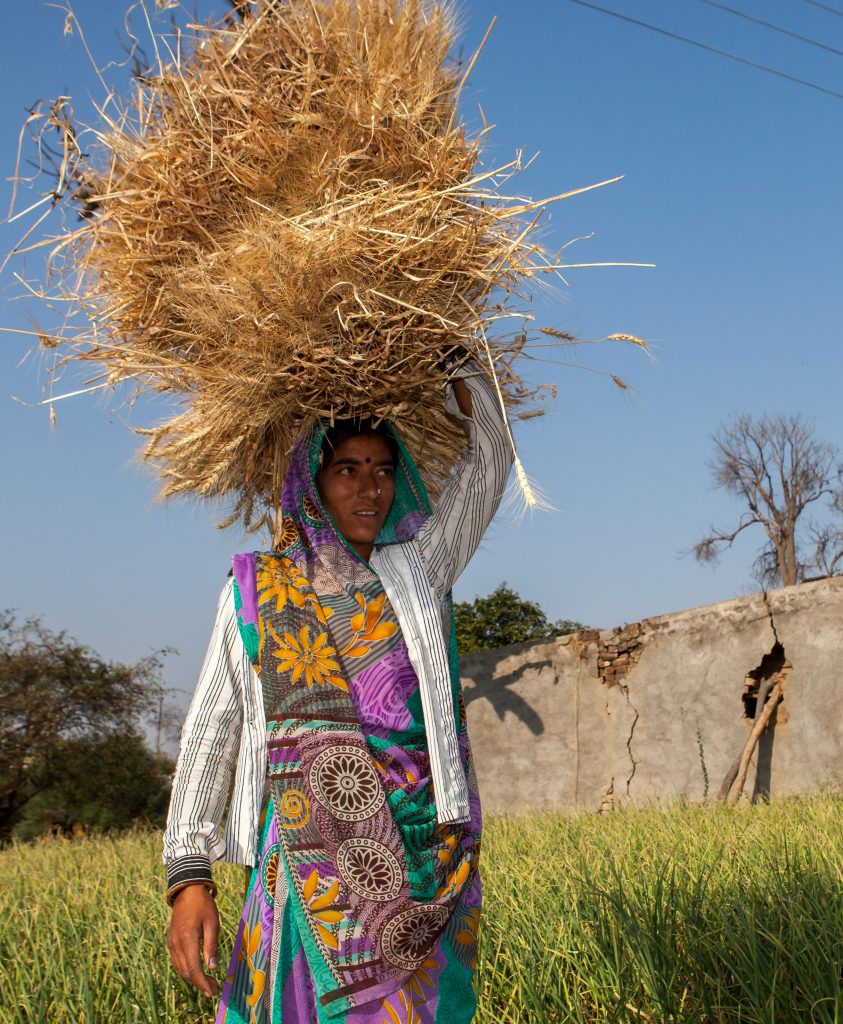Nutrition, health and food security
As staple foods, maize and wheat provide vital nutrients and health benefits, making up close to two-thirds of the world’s food energy intake, and contributing 55 to 70 percent of the total calories in the diets of people living in developing countries, according to the U.N. Food and Agriculture Organization. CIMMYT scientists tackle food insecurity through improved nutrient-rich, high-yielding varieties and sustainable agronomic practices, ensuring that those who most depend on agriculture have enough to make a living and feed their families. The U.N. projects that the global population will increase to more than 9 billion people by 2050, which means that the successes and failures of wheat and maize farmers will continue to have a crucial impact on food security. Findings by the Intergovernmental Panel on Climate Change, which show heat waves could occur more often and mean global surface temperatures could rise by up to 5 degrees Celsius throughout the century, indicate that increasing yield alone will be insufficient to meet future demand for food.
Achieving widespread food and nutritional security for the world’s poorest people is more complex than simply boosting production. Biofortification of maize and wheat helps increase the vitamins and minerals in these key crops. CIMMYT helps families grow and eat provitamin A enriched maize, zinc-enhanced maize and wheat varieties, and quality protein maize. CIMMYT also works on improving food health and safety, by reducing mycotoxin levels in the global food chain. Mycotoxins are produced by fungi that colonize in food crops, and cause health problems or even death in humans or animals. Worldwide, CIMMYT helps train food processors to reduce fungal contamination in maize, and promotes affordable technologies and training to detect mycotoxins and reduce exposure.
Harnessing maize biodiversity for food security, improved livelihoods in Africa
 Capacity development
Capacity development
Diverse, stress tolerant maize varieties are benefiting smallholders throughout sub-Saharan Africa.
New Publications: Maize Lethal Necrosis survey reveals farmer impact, future needs
 Capacity development
Capacity development
A new study reveals the need for continued development of maize varieities resistant to MLN and strengthening farmer resilience.
Farmer livelihoods at risk as wheat blast disease emerges in Bangladesh
 Nutrition, health and food security
Nutrition, health and food security
International scientists are on high alert as they develop tactics to fight wheat blast in Bangladesh, which is affecting a large portion of the country’s wheat growing area.
Bayer collaboration promises new innovations for South Asia farms
 Climate adaptation and mitigation
Climate adaptation and mitigation
CIMMYT and Bayer’s Crop Science team are looking for practical solutions to future climate-change related challenges in South Asian agriculture.
Kenyan maize nutrition and safety get boost from ancient Mexican technique
 Nutrition, health and food security
Nutrition, health and food security
Modern nixtamalization technology could increase maize uses and offer Kenyans invaluable benefits.
How improved maize gives options to farmers
 Nutrition, health and food security
Nutrition, health and food security
Improved seeds resilient to drought, disease and other stresses allow farming families to invest more in their livelihoods and children’s futures.
Tanzania seed company increases demand for drought-tolerant maize
 Nutrition, health and food security
Nutrition, health and food security
Locally adapted marketing initiatives are successfully converting farmers to the high-performing, drought-tolerant maize variety Lubango in Tanzania.
Improving diet through nutritious maize in Colombia
 Innovations
Innovations
A field day was organized at the International Center for Tropical Agriculture to show the advances of biofortified maize in Colombia.
SIMLESA meeting reveals many successes, gears up for phase II
 Nutrition, health and food security
Nutrition, health and food security
SIMLESA discusses progress, achievements, and ways forward through 2018 at annual meeting.
New varieties reignite maize production in Pakistan
 Nutrition, health and food security
Nutrition, health and food security
New maize varieties have the potential to increase production, enhance nutrition and strengthen national industry in Pakistan.
Global wheat breeding returns billions in benefits but stable financing remains elusive
 Climate adaptation and mitigation
Climate adaptation and mitigation
What do a chapati, a matza, or couscous have in common? The answer is wheat, which is a source for one-fifth of the calories and protein consumed globally.
CIMMYT kicks off 50th anniversary celebrations in southern Africa
 Climate adaptation and mitigation
Climate adaptation and mitigation
CIMMYT’s Southern Africa regional office celebrated 50 years of agriculture research for development in Harare, Zimbabwe.
Award recognizes agronomist Ram Malik for successes in India’s rice-wheat systems
 Nutrition, health and food security
Nutrition, health and food security
Ram Kanwar Malik recognized for 30 years of improving India’s rice-wheat systems.
Millions of smallholders in Africa benefit from climate resilient drought-tolerant maize
 Climate adaptation and mitigation
Climate adaptation and mitigation
At least 40 million smallholder farmers in sub-Saharan Africa are profiting from more than 200 new drought-tolerant varieties of maize.
Global wheat community discusses research, partnerships at Obregon pilgrimage
 Nutrition, health and food security
Nutrition, health and food security
For hundreds of international agricultural development experts, an annual gathering in northern Mexico provides a vital platform for sharing and debating the latest wheat breeding news and research.
